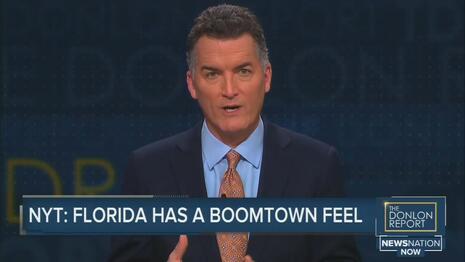 Hesitantly and petulantly, the New York Times is conceding Florida may have actually done something right in its handling of the coronavirus, balancing health and life issues. Patricia Mazzei, the paper's Miami bureau chief, had a front-page slot on Sunday for “Focusing on the Bright Side in the Sunshine State.”
Hesitantly and petulantly, the New York Times is conceding Florida may have actually done something right in its handling of the coronavirus, balancing health and life issues. Patricia Mazzei, the paper's Miami bureau chief, had a front-page slot on Sunday for “Focusing on the Bright Side in the Sunshine State.”
The text box injected some caution: “Defying Virus, Florida Has Boomtown Feel, for Better or Worse.”
The online subhead dampened the mood further: “Floridians are out and about and pandemic restrictions have been lifted. There’s just one problem: The virus never went away.”
Other than New York, no big city in the United States has been struggling with more coronavirus cases in recent weeks than Miami. But you would hardly know that if you lived here.
….
Much of life seems normal, and not just because of the return of Florida’s winter tourism season, which was cut short last year a few weeks into the pandemic.
Florida reopened months before much of the rest of the nation, which only in recent days has begun to emerge from the better part of a year under lockdown.
Mazzei captured the “boomtown feel” of Florida.
Realtors cold-knock on doors looking to recruit sellers to the sizzling housing market, in part because New Yorkers and Californians keep moving in. The unemployment rate is 5.1 percent, compared to 9.3 percent in California, 8.7 percent in New York and 6.9 percent in Texas. That debate about opening schools? It came and went months ago. Children have been in classrooms since the fall.
Then came the caveats:
For better or worse, Florida’s experiment in returning to life-as-it-used-to-be offers a glimpse of what many states are likely to face in the weeks ahead, as they move into the next phase of the pandemic -- the part where it starts to be over.
Mazzei twice characterized Republican Gov. Ron DeSantis (whom the paper disdains for his closeness to Donald Trump) as either having “boasted” or “gloated” about Florida’s success compared to other states.
To bask in that feeling -- even if it is only that -- is to ignore the heavy toll the coronavirus exacted in Florida, one that is not yet over.
More than 32,000 Floridians have died, an unthinkable cost that the state’s leaders rarely acknowledge. Miami-Dade County averaged more than 1,000 new coronavirus cases a day over the past two weeks, one of the nation’s most serious outbreaks. And Florida is thought to have the highest concentration of B.1.1.7, the more contagious virus variant first identified in the United Kingdom.
Yet Florida’s death rate is no worse than the national average, and better than that of some other states that imposed more restrictions, despite its large numbers of retirees, young partyers and tourists. Caseloads and hospitalizations across most of the state are down. The tens of thousands of people who died were in some ways the result of an unspoken grand bargain -- the price paid for keeping as many people as possible employed, educated and, some Floridians would argue, sane.
“Grand bargain?” That's a nasty concept. Again, Florida, despite having a large share of vulnerable elderly, has performed at the national average for per capita death rate.
When you read “many people” in the next sentence, just insert “many media liberals.”
Florida’s approach infuriated many people. When the state did not close beaches, there was national outrage, though the decision seems obvious in retrospect, given how much safer people are outside.
Actually, it was known early on that the virus spread far less virulently outdoors.
Mazzei credited DeSantis for protecting “the state’s many older residents, banning visitors in nursing homes until October and swiftly moving people 65 and older….to the front of the line for vaccines." She even compared Florida favorably to New York: "Florida also did not allow hospitals to discharge coronavirus patients back into nursing homes, unlike New York, a policy that likely avoided more fatalities."
New York under who? The Times didn't mention it.




